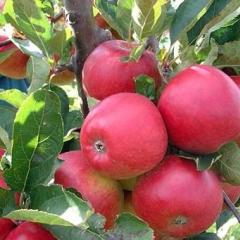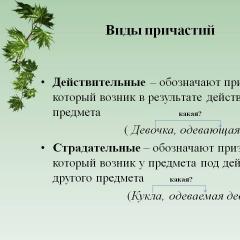Participle and participle: definition, spelling, rules
The participle and participle are special parts of speech that combine the morphological features of several parts of speech. This is how they differ from the rest. By the way, many linguistic scientists attribute the participle and gerunds to verb forms, and do not separate them into a separate part of speech. In this article, we will talk about them as independent ones.
The concept of the sacrament
The participle and participle in the Russian language are united by the fact that both of these parts of speech contain some morphological signs of the verb: the categories of type, recurrence and tense.
However, the participle gravitates towards adjectives and expresses a sign of an object or phenomenon by its action: reading, listening, building, reading. This part of the speech answers the questions what is doing? what did he do ?. From the adjective, the participle "inherited" gender, number and case - thus they agree with the noun to which they relate: a written book - written books (plural) - about a written book (prepositional case) - a written novel (masculine) ...
Also, the participle can be used in full and short forms. The awarded diploma - the certificate was presented. Unlike adjectives, only one letter n is written in short participles. Foggy lowland - foggy lowland (short adjective); sown field - field sown (short participle).
The participles, depending on the meaning, can be real (denote a sign created directly by an action - building) or passive (denote a sign of an action experienced from the outside - built).
The concept of the gerunds
The gerunds grammatically tend to the adverb: from it part of speech has taken on immutability, but from the verb the gerunds have remained the form (listening - listening) and reflexivity (washing - washing).

The verbal participle denotes an additional, additional action; it can be easily replaced with a homogeneous predicate.
- I walked down the street, enjoying the spring sun. - I walked down the street and enjoyed the spring sun.
The complementary action indicates how the main verb works. She walked rejoicing - the verbal participle "rejoicing" means an additional sign, an emotion with which the main action "walked" is performed.
Valid participles: education, suffixes
The participle and participle are formed from verbs using specific suffixes. As for the real participles of the present tense, their productive stem is a verb of the same tense. In the latter, the ending is simply swept aside and the characteristic participle suffix is added: - gs - / - yusch- and - asch - / - box-.
It should be remembered here that the first suffixes are characteristic of participles formed from verbs of the first conjugation, - asch - / - box- used in participles from verbs II conjugation.
- Sunbathing - sunbathing (present tense verb, I conjugation) - sunbathing (real present participle).
- Glue - glue (present tense verb, II conjugation) - glue (valid present participle).
![]()
The same past participles are formed from the stem of the verb of the same tense using suffixes -wsh-, -sh-.
- Carry - carried - carried, crawl - crawl - crawl.
The unstressed vowel before the suffix (the word is put in the past tense) is also checked to blow - blown - blown.
Passive participles: education, suffixes
The painful participles of the present tense must be formed from the stem of the verb I or II conjugation using suffixes -em - / - im- respectively.
- Decide - Decide - Decide; wear - wear - wearable.
Suffixes - enn-, -nn-, -t- are used to form passive past participles. The generating stem is an infinitive verb: to decide - solved; wash - washed; read - read. It should be remembered that in the suffix - yenn- only the letter e is always written after the hissing ones. For example, burnt, resolved. 
In addition, two letters are always written in the same suffix. n... This is how participles differ from verbal adjectives. The latter do not have prefixes and dependent words - they are written with one letter n. Sauerkraut (verbal adjective) - sauerkraut (participle, there is a dependent word) - sauerkraut (participle, there is a prefix)
Gerunds: education, suffixes
The participle and participle are similar in that both have a verb derived stem.
If we talk about imperfective participles, then the stem of the present tense verb is taken and the suffix is added to it - but- or - I-.
- Watchman - watchman; shine - shine; moving - moving; breathe - breathing.
There are a number of verbs from which the formation of a participle is not possible: plow, bake, sew, dance.
If we talk about perfect participles, then they should be formed from the base of the infinitive. This involves the suffixes -v-, -lice-, -shi-. For example, write - by writing, by writing; bring - bring.
Thus, the spelling of participles and gerunds suffixes depends on the type of the verb of the generating stem, its conjugation. Also, sometimes the type should be taken into account (this is especially true for gerunds). The suffixes of participles and gerunds of various meanings should be known by heart, then their correct spelling will not cause difficulties.
Spelling not with participles and participles
It should be said about one more spelling, which often causes difficulties. How to write a particle not, participle and gerunds. The rules regarding the latter are quite simple: with the gerunds, this particle is written separately, except for words that are not used without it. For example: not doing, not thinking, not grabbing, not bringing, but indignant, hating.

The participle will not be written separately in the following cases:
- He has dependent words. In other words, if there is not a single participle, but a participle turnover (Flowers that were not picked yesterday bloomed in all their glory).
- There is an opposition in the sentence, built with the help of a union but ( They were not withered, but quite fresh flowers).
Together not with participles will be written outside the participle turns: incessant downpour, unplowed field, unread book.
Also written together with not participles that are not used without this particle: indignant, hating.


